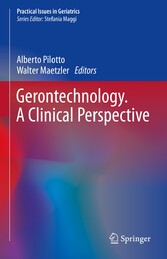Suchen und Finden
Service

Gerontechnology. A Clinical Perspective
Alberto Pilotto, Walter Maetzler
Verlag Springer-Verlag, 2023
ISBN 9783031322464 , 214 Seiten
Format PDF
Kopierschutz Wasserzeichen
Geräte
This book aims at disseminating information and knowledge in Gerontechnology, a topic that is still considered a specific area of interest for techno-experts (i.e. informatics, engineers, bio-engineers, bio-statistics, etc.) while there is a relatively low diffusion of technological expertise among clinicians and other health professionals who are involved in the care of older people.
In many parts of the world, average life expectancy is rising consistently, and at the same time technology is developing at a dramatic pace. This means having completely new options for the diagnosis, treatment and follow-up of diseases and disabilities of older people but also a new challenge to improve the quality of life by promoting an active and healthy aging at population level.
This book explores the technical developments that are beginning to change the management of diseases and disabilities of geriatric patients. These include advanced Information and Communication Technologies (ICT), i.e. the new online services in healthcare and electronic medical-health records, Assistive Technologies (AT), i.e. behavior and motility monitoring sensorial tools, smart homes tools and telemedicine tools as well as Human-Computer Interaction technologies (HCI), i.e. robots for supporting people with mobility or cognitive limitations, humanoid robots, exoskeletons and rehabilitation robots.
The Work is divided into three main parts: 1) Technology in a world of aging people, 2) Clinical applications of technologies in older people, and 3) Older people and technologies interaction including privacy issues, acceptability of technologies by older people and education and training of healthcare professionals in gerontechnology.
The book will be an invaluable tool for geriatricians and other health professionals who are involved in the care of older people.
Alberto Pilotto is the Director of the Department Geriatric Care, OrthoGeriatrics and Rehabilitation at the E.O. Galliera Hospital, National Relevance and High Specialization Hospital, in Genoa, Italy and full professor of Geriatrics at the Department of Interdisciplinary Medicine at the 'Aldo Moro' University of Bari, Italy.
His clinical and research activities are focused on innovations in geriatric care including the multidimensional approach to frailty and multi-morbidity and the development and clinical validation of technological solutions for the older people. Principal investigator and coordinator of many research projects co-funded by public entities including the Italian Ministry of Health (Net-Research Program MULTIPLAT_AGE 'Multicomponent intervention platform in community-dwelling older people by using domotic, robotic and telecare systems' and PRO-HOME project 'Development and validation of a care transition model in a home-oriented protected area by using high technology systems for multimorbid and polytreated older people'), European Union's Health Programs (Ambient Assisted Living Project HOPE, EU-Horizon 2020 MPI-AGE, EFFICHRONIC and WELLBASED projects and the NextGeneration EU Program on Recovery and Resilience Facility including RAISE Project 'Robotic and Artificial Intelligence for Socio-economic Empowerment' and AGE-IT Project 'Socioeconomic, biomedical and technological solutions for an inclusive ageing society). Co-author of more than 380 articles in international peer-review journals, 70 chapters of books, and four books on Aging and the Gastrointestinal Tract (Karger AG Press and Piccin Editore) and the Comprehensive Geriatric Assessment (Springer AG International). Editor in Chief of the Journal Geriatric Care. Former member of the Geriatric Working Group of the AIFA (Italian Medicines Agency) and consultant of the Geriatric Expert Group of the EMA (European Medicines Agency). Presently he is the President of the Italian Geriatric Society Hospital and Community (SIGOT) and co-leader of the Special Interest Group on Comprehensive Geriatric Assessment of the European Geriatric Medicine Society (EuGMS). Prof. Maetzler is Full professor for neurogeriatrics and deputy director of the neurology department of the University Hospital in Kiel, Germany. His main clinical interest is on Parkinson's disease and other age-related disorders and geriatric conditions associated with functionally relevant movement and cognitive disabilities. He leads a research group focusing on the analysis and validation of parameters that can be extracted from wearable sensor technology in supervised ('lab- or clinic-based') and unsupervised (the usual environment of the patients) assessments, and then be used to quantify movement, mobility and human behaviour in these usual environments. He is contributing to new technology development, such as magnetoelectric sensors. He was and is involved as coordinator, principal investigator, chief clinical investigator and workpackage leader in multiple national and international projects investigating the potential of mobile sensor technology to improve the understanding of disease progression and treatment response in age-related diseases. Examples at a European level are Fair-Park II, Keep Control, Moving Beyond and SENSE-PARK, as well as the large Innovative Medicines Initiative (IMI) projects IDEA-FAST und Mobilise-D. IDEA-FAST aims at developing digital parameters for the assessment of fatigue and sleep disorders in the usual environment, and Mobilise-D aims at developing and validating an algorithm for mobility assessment, derived from a single sensor, in the usual environment. These developments are being made in consultation with the European Medicines Agency (EMA) and the US Food and Drug Administration (FDA). He is co-author of more than 330 articles in international peer-reviewed journals and of multiple book chapters. Currently, he serves as the co-chair of the Technology Working Group of the Movement Disorders Society.
Shop


